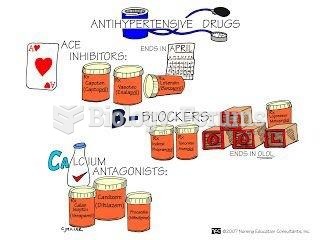|
|
|
Earwax has antimicrobial properties that reduce the viability of bacteria and fungus in the human ear.
Many people have small pouches in their colons that bulge outward through weak spots. Each pouch is called a diverticulum. About 10% of Americans older than age 40 years have diverticulosis, which, when the pouches become infected or inflamed, is called diverticulitis. The main cause of diverticular disease is a low-fiber diet.
More than 30% of American adults, and about 12% of children utilize health care approaches that were developed outside of conventional medicine.
Blood in the urine can be a sign of a kidney stone, glomerulonephritis, or other kidney problems.
Barbituric acid, the base material of barbiturates, was first synthesized in 1863 by Adolph von Bayer. His company later went on to synthesize aspirin for the first time, and Bayer aspirin is still a popular brand today.







